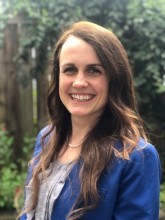One Church Many Cultures The Good News of Cultural Diversity Newsletter Spring/Summer 2021
Journeying Together – Young Adult Ministry
Honoring the Body Christ
By: Anna Johnson, Young Adult Ministry leader - Anna Johnson, Maryknoll / Seattle WA
Throughout Journeying Together, I have been challenged, invited, and stretched, and my faith has expanded. One Black African American panelist asked, “Do we feel we are guests at the table of the Lord, rather than a part of the body of Christ?” This question sticks with me, particularly as the point echoes across other sessions.
Thinking about my own body, when I hear music, my feet begin tapping along to the beat. This tapping, if I allow myself, can fill my whole body with joy and dancing. When I ignore my feet, my entire body misses out on the joy of the dance. I felt this with the drumming prayer during the session led by those representing communities under the Pastoral Care of Migrants, Refuges and Travelers (PCMRT): a prayer of joy, celebration, and giving glory to God, in a form I don’t often experience. If I don’t acknowledge and respond to the invitation of Christ’s dancing feet, moving me to joy and celebration, then my life and prayer will certainly be diminished.
On the flip side, when part of my body is hurting, my entire body suffers. I need to name which body part hurts to the doctor, who then tells me what the rest of the body can do to address the pain’s source and heal. In Journeying Together, we have also heard deep hurt in the Body of Christ. We need to recognize and listen to the part of the Body that is hurt, and then take Spirit-informed action. For me, this action must include recognizing and responding to how I have inflicted harm, intentionally or unintentionally. As Corinthians says, “The eye cannot say to the hand, ‘I do not need you!’”
When I center on European American experiences of faith, obscuring the rest of the body of Christ —such as Native American Indigenous histories, experiences, and wisdom— I am saying, “I do not need you.” When I look away from the pain that caused a small group member to share, “I love this Church, but I’m not sure it loves me back,” I am saying, “I don’t need you.” Reminded of the incredible hospitality I have received from many PCMRT community members, when I do not extend that same welcome forward, I am saying, “I don’t need you.” When I see the dignity and lives of AAPI and Black/ African American members of the Body of Christ not upheld and do not act, I am saying, “I do not need you.” It is uncomfortable and painful to see how I have harmed the Body of Christ, but as with any bodily harm, we must draw near to it in order to seek forgiveness and healing.

